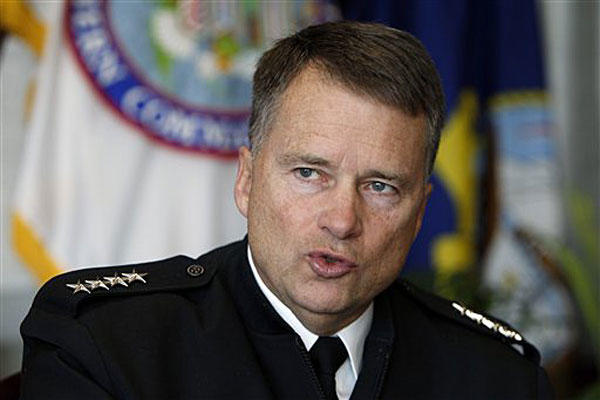The expected retirement this fall of Chairman of the Joint Chiefs Gen. Martin Dempsey and upcoming vacancies in several other top military posts have ramped up speculation on a range of successors.
In addition to Dempsey stepping down in September, the terms of Army Chief of Staff Gen. Ray Odierno and Chief of Naval Operations Adm. Jonathan Greenert are also due to end in the fall. The second, two-year appointment of Joint Chiefs Vice Chairman Adm. James A. "Sandy" Winnefeld will also run out in September.
At the Pentagon on Tuesday, officials were declining comment on a report by Defense One that Navy Adm. Samuel Locklear, head of U.S. Pacific Command, had been asked to delay his retirement to give Defense Secretary Ashton Carter time to consider whether to recommend him as Dempsey's replacement.
At the same time, the White House was tamping down speculation on Winnefeld, known to be a favorite of the Obama administration, after Winnefeld was spotted boarding Air Force One with President Obama on a trip to Atlanta, where Obama spoke at Georgia Tech on lowering college costs.
Winnefeld's presence prompted the first question at a press gaggle on Air Force One. Deputy White House Press Secretary Eric Schultz said "the admiral is a proud and active alum of Georgia Tech University, so he is joining us in that capacity."
In his remarks at Georgia Tech, Obama gave a lengthy shout out to his "special guest," Winnefeld. "Before he was the Vice Chairman of the Joint Chiefs of Staff, he was a Navy fighter pilot, which is cooler. Now he just goes to meetings. What's up with that? I told him he's got to get back on a plane."
Locklear's delayed retirement has also left Adm. Harry Harris, commander of the Pacific fleet, waiting as he was confirmed by the Senate to succeed Locklear on Dec. 11.
Another possible hold-up in Locklear's retirement was the ongoing investigation led by the U.S. Attorney's office in San Diego into the "Fat Leonard" corruption scandal that has already ensnared several Navy officers serving in the Pacific.
Last month, Rear Adms. Mike Miller, Terry Kraft and David Pimpo received letters of censure from Navy Secretary Ray Mabus in the bribery and corruptions cases stemming from the operations of Glenn Defense Marine Asia (GDMA) and chief executive officer Leonard Glenn Francis, known to the fleet as "Fat Leonard."
The Pentagon would not confirm the report by Defense One citing unnamed defense officials as saying that the delay in Locklear's retirement was not related to the Fat Leonard investigations.
Other Possible Dempsey Successors
Others considered to be on the short list of possible successors to Dempsey were Marine Commandant Gen. Joseph Dunford, Air Force Chief of Staff Gen. Mark Welsh, and Army Gen. Lloyd Austin, the head of U.S. Central Command who is overseeing the current campaign against ISIS.
Dunford, the former top U.S. commander in Afghanistan, won praise from the White House for engineering Obama's initial troop withdrawal plan and setting the stage for the eventual Bilateral Security Agreement that allowed for the continued training and advisory U.S. troop presence.
Dunford has just begun a major overhaul in the missions of the three Marine Expeditionary Forces. However, this was also the case for Dempsey, who was named the Army chief of staff shortly before Obama asked him to take over as CJCS.
Austin, who graduated from West Point, served as the leader of the U.S. withdrawal from Iraq. He has since overseen the end of combat operations in Afghanistan and the fight against the Islamic State of Iraq and Syria (ISIS) as the head of CentCom.
He has recently impressed the White House with his smooth performances at Pentagon briefings and Capitol Hill hearings.
As head of the Pacific Command, Locklear could be considered as having an advantage in deliberations on a Dempsey successor, given the long-standing commitment of the Pentagon and the White House to the so-called "Pacific pivot" of U.S. forces to the Asia-Pacific region.
However, backing for the Pacific pivot has cooled on Capitol Hill as the focus on the Middle East and the threats from Iran and ISIS has intensified.
At a House Armed Services committee hearing last week at which Austin testified, Rep. Mac Thornberry, R-Texas, the committee's chairman, said that the Pacific pivot "has proven to be naïve at best" in the context of the current turmoil in the Mideast.
-- Richard Sisk can be reached at Richard.Sisk@military.com.































